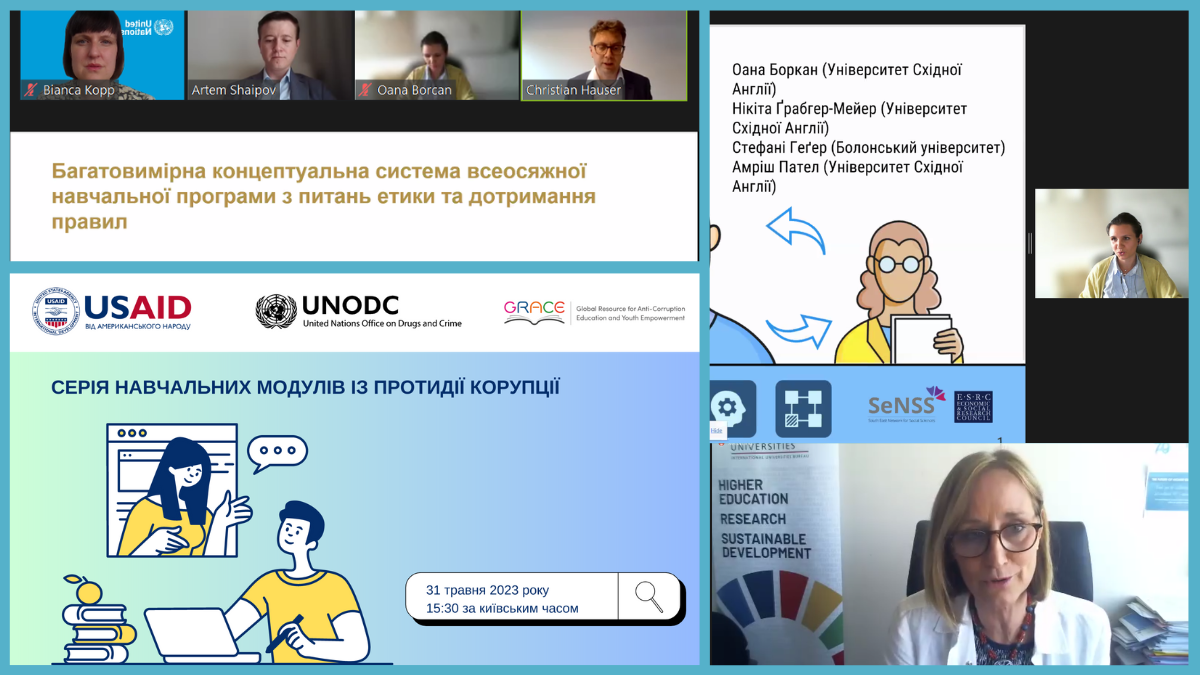|
|
UNODC AND USAID SUPPORT ANTI-CORRUPTION EDUCATION AT UNIVERSITIES IN UKRAINE |

31 May 2023 – As a fundamental human right, access to education is crucial in promoting a peaceful and prosperous world. During times of conflict, however, the continued provision of education is even more crucial given its long-term impact on post-conflict efforts.
In Ukraine, school and university closures have disrupted this delivery of education, with 1,888 education institutions having suffered bombing since the start of the conflict in 2022.
The teaching of ethics, integrity and anti-corruption are important in promoting key values among young people. To advance this, UNODC has been working with the USAID Justice for All Activity to roll-out a set of dedicated university modules in Ukrainian.
Speaking during an online event to launch the university modules, Andriy Butenko, Head of the National Agency for Higher Education Quality Assurance of Ukraine, highlighted the quality of UNODC’s university modules on ethics, integrity and on anti-corruption and noted not only the ease for lecturers from universities in Ukraine to integrate them into their courses, but the importance of doing so. “Despite all the tragedies, we can see that Ukrainians want to change…corruption affects our society and we need to do more to prevent and fight corruption in our country.”
Hilligje van’t Land, Secretary-General of the International Association of Universities, meanwhile flagged the importance of anti-corruption education, and highlighted the crucial role that universities have in achieving the Sustainable Development Goals (SDG), particularly SDG 16. “Universities and other higher education institutions are key players when it comes to addressing the global goals adopted as part of the 2030 Agenda; they help develop competences for a democratic culture and build capacities among students and staff to prevent corruption. Peace, Justice and Strong Institutions, as described in SDG 16, are the fundamental building blocks to reach the goals set by the UN and, in general, a prerequisite for a more sustainable and just society and future.”

Delivered through UNODC’s Global Resource for Anti-Corruption Education and Youth Empowerment initiative – or GRACE – the university modules are designed to promote youth empowerment and assist educators in raising awareness on the impact corruption has and how to prevent and counter corruption. Free to access, the UNODC university modules have been developed by academics for academics and are designed for use as either stand-alone teaching resources, or as a means of enhancing existing courses in a range of disciplines.
“Our university modules on ethics & integrity, as well as on anti-corruption, have been developed to support academics teaching at universities to empower their students to not only better understand the various forms of corruption but also gain knowledge on the impact this has on their society and how to prevent it”, noted Harsheth Kaur Virk, UNODC’s Head of Office in Ukraine. “We hope that lecturers teaching in Ukrainian will be able to use these within their communities, as we work together to promote ethics, integrity and anti-corruption, particularly in this time of crisis.”
“USAID strongly believes that quality legal education is a basis of well-functioning legal profession, and it is critical that anti-corruption be incorporated into this discipline, which is why we have worked so hard with so many of partners to institute this on a national level”, underlined Ann Hopper, Deputy Director of USAID Ukraine’s Office of Democracy and Governance.
The event brought together more than 320 participants from governmental agencies, and 80 universities and other educational institutions from across Ukraine, providing perspectives on the various behavioural studies that were conducted as part of the roll-out of the modules in various countries, and demonstrating the impact anti-corruption education at the university level can have. Speaking on this, Professor Christian Hauser, who leads the anti-corruption working group of the UN Global Compact Principles for Responsible Management Education (PRME) initiative, highlighted: “Behavioral ethics research clearly shows that raising awareness and knowledge about corruption is not enough to change behaviour in everyday life. Therefore, anti-corruption education efforts must be designed in a well-tailored, sequential manner to empower students to act with integrity.”
“As a result of our joint efforts, a broad group of educators from all over Ukraine received practical, evidence-based recommendations on how to teach anti-corruption using the modules that connect theory to practice, encourage critical thinking, and use innovative interactive teaching approaches”, noted David Vaughn, Chief of Party of the USAID Justice for All Activity. “They are now better equipped to empower the next generation of legal professionals to resist and prevent corruption making anti-corruption a part of the country's culture.”
Through its GRACE initiative, UNODC supports academics in coming up with ways to empower their students to become guardians of integrity. Closing the event, Bianca Kopp, leading UNODC’s GRACE initiative, and Artem Shaipov, Legal Advisor, USAID Justice for All Activity, invited Ukrainian lectures to work closely with the two organizations to localize the university modules and tailor them to the national context. “Preventing corruption is not the responsibility of the countries alone, we need a whole-of-society approach to prevent and counter this threat,” concluded Ms. Kopp. “Working closely with educators and higher education institutions is key to this.”